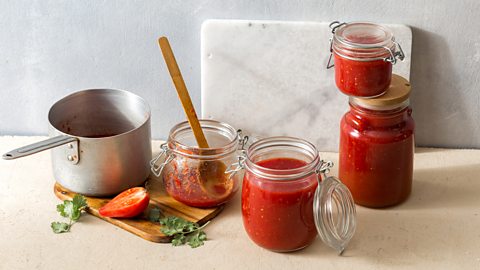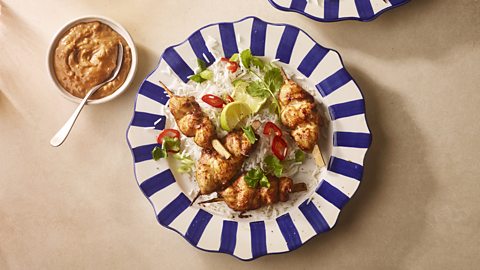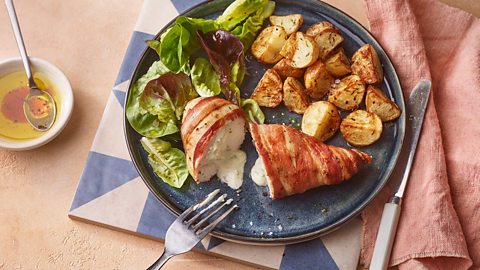Is garlic really good for your health?
Garlic is rumoured to cure colds, reduce high blood pressure, lower cholesterol and more. But does the science stack up? And how can you add more of it to your diet?

If you believe the rumours, you might be tempted to reach for the garlic next time you feel a common cold coming on - just don’t actually stick it up your nose!
It's not just colds that people often suggest garlic can help with. But does the science agree? We take a look…
Does garlic benefit general health?
“Garlic contains high levels of potassium, phosphorus, zinc, sulfur and moderate amounts of magnesium, manganese and iron. It’s a bit of a wonder vegetable,” explains British Dietitian Association spokesperson and paediatric dietician, Bahee Van de Bor.
“Raw garlic is known for its high allicin content, a sulfur compound that's linked to various health benefits… It’s absolutely good for us. Not only does it offer a rich array of essential nutrients but also serves as an excellent source of prebiotic fibre, which is crucial for providing nourishment for the beneficial bacteria residing in our gut.
“These friendly microbes rely on such fibre to flourish and maintain the overall health of our digestive system.”
This pesto is made with raw garlic, which is linked to positive health
Can garlic lower cholesterol and blood pressure?
One 2016 Iran study saw participants consume a mixture 20g garlic and one tablespoon of lemon juice daily for eight weeks. The results were positive and both cholesterol levels and blood pressure were lowered.
Another study published the same year found that garlic supplements could lower blood pressure.
However, ask Stanford University and you’ll get a different answer. In 2007, scientists at the institution published a paper debunking the ‘myth’ that garlic lowers cholesterol.
“Among 200 generally healthy adults with modestly elevated cholesterol, six months of receiving garlic failed to lower blood cholesterol (LDL-cholesterol).
“The garlic was provided at a dose of one clove/day,” explains Prof. Gardner lead author on the study.
Considering recent papers saying garlic can provide cardiovascular benefits, has Gardner changed his position? “Our study involved 200 participants, over six months, and had very high retention and internal validity. It was a $1.4m study funded by the National Institutes of Health (NIH).
“I would be surprised if a study of equal rigor has been done since our study was published but would be very interested in seeing it if it is available.
“It is plausible that garlic could have many potential health benefits. It is challenging to show these benefits in a well-designed, and well-conducted study,” says the expert.
Confit garlic
Soft and spreadable, confit garlic is surprisingly easy to make
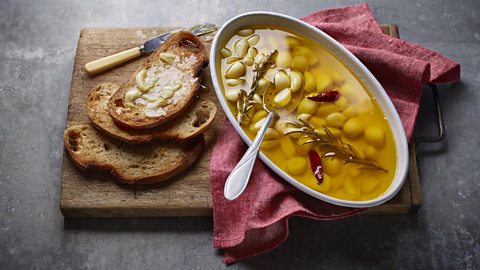
Does garlic have anti-cancer effects?
Prof. Marit Otterlei and her colleagues at the TNU Norwegian University of Science and Technology investigated this as part of their cancer research.
“We found that fresh raw garlic extracts (and therefore likely fresh raw garlic) lead to the activation of a cellular stress mechanism that is important for the clearance/killing of cells that have problems with their protein production/renovation [something people with cancer experience]. We think this is important for garlic’s biological effects [on cancer].”
The team made a garlic extract using fresh garlic and ethanol. The result? “It could be beneficial in several types of cancer.
“There are several epidemiological studies suggesting beneficial effects in cancers such as colon, rectum, breast and prostate. We tested the extracts in a mouse model of breast cancer and found that it had anti-cancer effects.”
Related stories
- How to eat more of the lifesaving nutrient 90% of us lack
- What diet change should you make today to improve your health?
- How important is diet for a healthy immune system?
These results come with disclaimers, though. For example, the garlic mix could be ‘volatile’. When it was freeze-dried, it became less effective. “As many health products are freeze-dried, this is an important point.”
Secondly the study was carried out on animals rather than humans. However, Otterlei feels confident this could be replicated.
“In a recent study, which was a review of 83 human interventional trials using raw garlic, garlic extract or allicin, it was shown to have beneficial effects on multiple conditions including cancer.”
“Many of the epidemiological studies have looked at diets containing more than two cloves of raw garlic per week and found that this was associated with a lower risk of cancer.”
We can’t confirm whether this will improve your health but Anna Del Conte’s spaghetti with chilli, garlic and parsley recipe is truly delicious
Will garlic stop you getting a cold?
While some of the experts we spoke to were sceptical, there are studies that suggest garlic can prevent colds. Prof. Marc Cohen, University of Western Sydney has carried out research investigating this. The study he worked on found there was insufficient evidence to confirm or refute the claims. He does believe garlic could help, though.
“Evidence has emerged to support the use of garlic for infections and garlic has been found to have strong antimicrobial, antiviral and antifungal properties. A recent study on the anti-viral properties of garlic suggests garlic has potent antiviral activity and can block viral entry into host cells.”
When you have a cold, soup is a soothing dish and this healthy leek and potato soup comes with a garlicy vegetable stock
How to add more garlic into your diet
If there are health benefits to be had, “Incorporating garlic into your diet consistently is key,” says Van de Bor. “While there's no one-size-fits-all amount, aim to include garlic in your meals at least once a week.”
We asked cooking expert and author of the cookbook Garlic, Jenny Linford for her advice for getting the most out of garlic in your cooking…
Tailor the way you prepare garlic to the dish
“You can adjust its strength according to how you use it. When you crush garlic, you release all the compounds, so if you want a very powerful garlic flavour use crushed raw garlic, especially in dishes like pesto.
“To add just a hint of garlic to a dish, fry a whole peeled clove of garlic in olive oil until its golden, then remove the garlic. That garlicky oil can be used to dress cooked vegetable like spinach.
“Similarly, if you're making a salad and want just a touch of garlic, wipe the clove around the inside of the salad bowl before adding in the salad.”
Garlic mushroom frittata
This frittata comes with just one clove of garlic which adds to the flavour of the dish without overpowering it
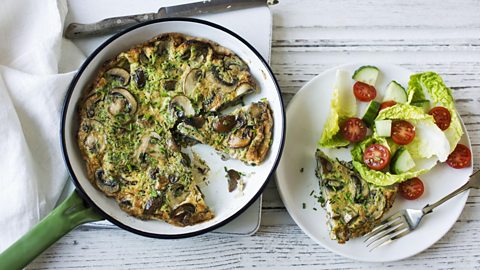
How to mellow the flavour of garlic
“I am very partial to roasting garlic. Take a whole bulb, slice off the top to expose the cloves, wrap it in foil and roast it in the oven for around 30 minutes until softened.
“This mellows and intensifies the flavour. You can add the whole roasted cloves to a savoury tart or mash them before adding to flavour soups or dips.”
Store your garlic at room temperature
“Begin by choosing a bulb which feels firm and store it in a cool, dry, dark place - NOT the fridge,” advises the expert. “If a clove feels soft and when you peel has discoloured, turning brown, then it has gone off, so don't use it.”
Want to up the garlic flavour? This Hairy Bikers recipe for Roast chicken with forty cloves of garlic packs a punch
Is garlic good for everybody?
For some, garlic can worsen stomach issues, “Unfortunately, it can indeed be a trigger for some individuals, particularly those with IBS. Therefore, it's crucial for anyone, including children with IBS, to identify their personal tolerance levels to garlic,” says Van de Bor.
“A great workaround for still enjoying that rich garlic flavour is to use garlic-infused oils in cooking. However, it's worth noting that while this method reduces the risk of triggering IBS symptoms, the oil typically contains lower levels of allicin, the compound responsible for many of garlic's health benefits.”
Originally published March 2024
